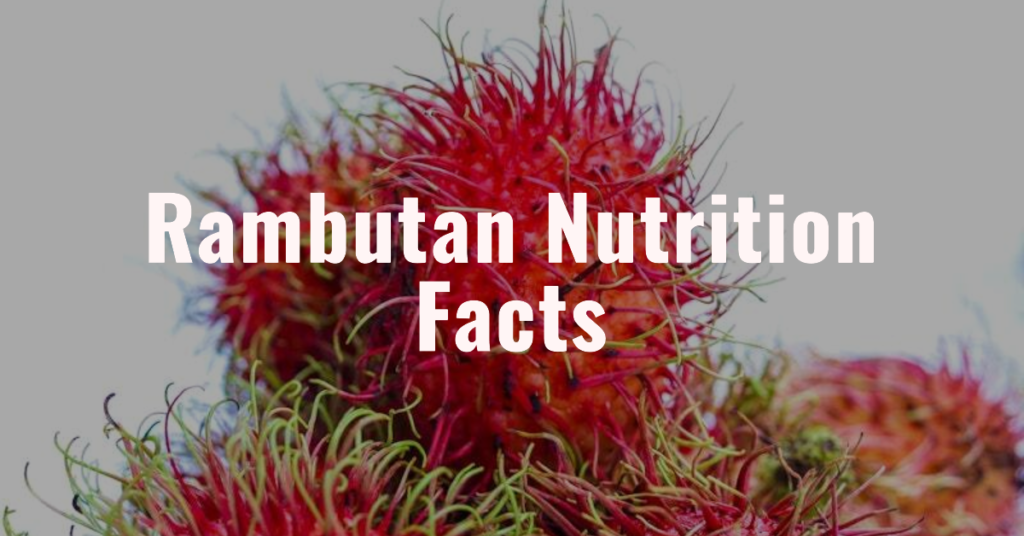So you’ve probably heard of rambutan, the exotic fruit known for its vibrant red exterior and spiky appearance. But have you ever wondered about its nutritional value? Well, look no further! In this article, we’ll be exploring the rambutan nutrition facts that make this fruit not only delicious but also a powerhouse of vitamins, minerals, and antioxidants. Get ready to learn all about the health benefits packed within this tropical delight.

Rambutan Nutrition Facts
Rambutan is a tropical fruit that is not only delicious but also packed with essential nutrients. From vitamins and minerals to antioxidants and fiber, rambutan offers a wide range of health benefits. In this article, we will explore the nutrition facts of rambutan and delve into its various components.
Overview of Rambutan
What is Rambutan?
Rambutan is a fruit that originated in Southeast Asia and is now cultivated in many tropical regions around the world. It is known for its distinctive appearance, with hairy red or yellow skin and sweet, juicy flesh inside. The name “rambutan” translates to “hairy” in Malay, which perfectly describes its outer appearance.
Origin and Cultivation
Rambutan trees thrive in warm, tropical climates and are native to Indonesia, Malaysia, and the Philippines. Today, they are cultivated in countries like Thailand, Vietnam, Sri Lanka, and the Caribbean. The cultivation of rambutan involves caring for the trees, providing adequate sunlight and water, and protecting them from pests and diseases.
Physical Appearance
Rambutan is a small fruit, about the size of a golf ball, with a round or oval shape. Its outer skin is covered in soft, flexible spines that give it a hairy appearance. The spines are usually red or yellow, depending on the variety. Once the skin is peeled away, the translucent white or pinkish flesh is revealed, encompassing a single seed inside.
Taste and Texture
The taste of rambutan can be described as a perfect balance of sweetness and tartness. The flesh is juicy and slightly acidic, similar to other tropical fruits like lychee and longan. The texture is smooth and slightly firm, providing a satisfying bite. Overall, rambutan offers a refreshing and tropical taste experience.
Vitamins in Rambutan
Vitamin C
Rambutan is an excellent source of vitamin C, which is essential for supporting a healthy immune system and promoting collagen production. In addition to its role as an essential nutrient, Vitamin C also acts as an antioxidant, protecting the body from harmful free radicals and reducing inflammation.
Vitamin A
Vitamin A is important for maintaining healthy eyesight, promoting good skin health, and supporting the immune system. Rambutan contains a moderate amount of vitamin A, contributing to overall well-being.
Vitamin B6
Rambutan is a good source of vitamin B6, which plays a crucial role in DNA synthesis, cognitive function, and hormone regulation. It also helps convert food into energy and supports the production of red blood cells.
Folate
Folate, also known as vitamin B9, is vital for the development of new cells and the synthesis of DNA and RNA. Rambutan provides a decent amount of folate, making it a valuable addition to a balanced diet.
Vitamin E
Vitamin E is a powerful antioxidant that helps protect cells from damage caused by free radicals. It also supports immune function and acts as an anti-inflammatory. Rambutan contains a small amount of vitamin E, contributing to its overall nutritional profile.
Minerals in Rambutan
Potassium
Potassium is an essential mineral that plays a crucial role in maintaining proper heart function, regulating blood pressure, and supporting muscle contractions. Rambutan is a good source of potassium, making it an excellent choice for maintaining a healthy electrolyte balance.
Calcium
Calcium is essential for maintaining strong bones and teeth, supporting proper muscle function, and promoting blood clotting. Although rambutan only contains a small amount of calcium, it still contributes to the overall mineral content of the fruit.
Iron
Iron is necessary for the production of red blood cells and the transportation of oxygen throughout the body. Rambutan contains a small amount of iron, which can contribute to overall iron intake when consumed as part of a balanced diet.
Phosphorus
Phosphorus is involved in various processes in the body, including energy production, bone health, and DNA synthesis. Rambutan provides a moderate amount of phosphorus, adding to its nutritional value.
Magnesium
Magnesium is important for nerve function, muscle contraction, and maintaining a healthy immune system. Rambutan contains a small amount of magnesium, contributing to its overall mineral content.
Antioxidants in Rambutan
Flavonoids
Flavonoids are a group of antioxidants that have been shown to have anti-inflammatory and antiviral properties. Rambutan contains various flavonoids, including quercetin and kaempferol, which help protect the body against oxidative stress and reduce the risk of chronic diseases.
Ellagitannins
Ellagitannins are natural compounds found in rambutan that have antioxidant and anti-cancer properties. These compounds have been shown to inhibit the growth of certain cancer cells and reduce inflammation in the body.
Catechins
Catechins are antioxidants commonly found in tea and certain fruits. Rambutan contains catechins that help prevent cell damage, reduce the risk of heart disease, and support overall health and well-being.
Anthocyanins
Anthocyanins are pigments responsible for the vibrant colors of many fruits and vegetables. Rambutan contains anthocyanins, which have antioxidant and anti-inflammatory properties. These compounds may also help protect against chronic diseases such as heart disease and cancer.
Proanthocyanidins
Proanthocyanidins are a type of flavonoid that have been shown to have antioxidant, anti-inflammatory, and anticancer properties. Rambutan contains proanthocyanidins, which contribute to its overall antioxidant content.
Protein Content in Rambutan
Protein in Rambutan
While rambutan is not considered a significant source of protein, it still contains a small amount. Protein is essential for building and repairing tissues, supporting immune function, and producing enzymes and hormones. Incorporating rambutan into a balanced diet can contribute to overall protein intake.
Amino Acid Profile
Rambutan contains a variety of essential and non-essential amino acids, which are the building blocks of protein. Essential amino acids are not produced by the body and must be obtained through diet. Rambutan provides a range of amino acids, supporting various physiological processes in the body.
Carbohydrate Content in Rambutan
Total Carbohydrates
Rambutan is predominantly composed of carbohydrates, which provide the body with energy. The total carbohydrate content of rambutan varies depending on the ripeness and size of the fruit. On average, it contains around 20 grams of carbohydrates per 100 grams.
Fiber
Fiber is a type of carbohydrate that cannot be digested by the body. It plays a crucial role in maintaining digestive health, promoting regular bowel movements, and controlling blood sugar levels. Rambutan contains a small amount of dietary fiber, contributing to overall fiber intake.
Sugar
Rambutan contains natural sugars, including glucose, fructose, and sucrose. The sugar content of rambutan can vary depending on the variety and ripeness of the fruit. Consuming rambutan in moderation as part of a balanced diet is recommended to maintain healthy blood sugar levels.
Fat Content in Rambutan
Total Fat
Rambutan is a low-fat fruit, with less than 1 gram of fat per 100 grams. This makes it a suitable option for those watching their fat intake or following a low-fat diet.
Saturated Fat
Saturated fat, found in animal products and some plant-based foods, is known to increase cholesterol levels and raise the risk of heart disease. Rambutan contains almost no saturated fat, making it a heart-healthy choice.
Monounsaturated Fat
Monounsaturated fats are considered healthy fats that can help reduce bad cholesterol levels and lower the risk of heart disease. While rambutan contains a negligible amount of monounsaturated fats, every little bit contributes to overall dietary fat intake.
Polyunsaturated Fat
Polyunsaturated fats are essential fats that play a role in brain function, cell growth, and reducing inflammation in the body. Rambutan contains a small amount of polyunsaturated fats, adding to its nutritional value.
Fiber Content in Rambutan
Benefits of Dietary Fiber
Dietary fiber is an important component of a healthy diet. It helps maintain digestive health, promotes regular bowel movements, and aids in weight management. Fiber also helps control blood sugar levels, reduce cholesterol levels, and prevent certain types of cancers.
Fiber Content in Rambutan
Rambutan contains a small amount of dietary fiber, with approximately 0.9 grams per 100 grams. While this may not seem significant, incorporating rambutan into a diet rich in other fiber sources can contribute to overall fiber intake and support digestive health.
Glycemic Index of Rambutan
Understanding Glycemic Index
The glycemic index (GI) is a scale that measures how quickly a food raises blood sugar levels. Foods with a high GI value are rapidly digested and cause a sharp increase in blood sugar levels, while those with a low GI value are digested more slowly, resulting in a slower rise in blood sugar levels.
Glycemic Index of Rambutan
The GI value of rambutan is relatively low, indicating that it has a minimal impact on blood sugar levels. This makes it a suitable choice for individuals with diabetes or those wanting to maintain steady blood sugar levels.
Effects on Blood Sugar Levels
Due to its low GI value, rambutan provides a steady release of energy and does not cause a rapid spike in blood sugar levels. This can be beneficial for individuals looking to manage their blood sugar levels or those practicing portion control.
In conclusion, rambutan is not only a delicious tropical fruit but also a nutrient-dense addition to a healthy diet. With its abundance of vitamins, minerals, antioxidants, and fiber, rambutan offers a wide range of health benefits. Whether you enjoy its sweet and tangy flavor or appreciate its nutritional profile, incorporating rambutan into your diet can contribute to overall well-being. So why not give this exotic fruit a try and reap the rewards it has to offer?

Hi, I’m King Phils, a Dragon Fruit enthusiast and blogger. Welcome to my website, where I share everything I know and love about this amazing fruit.